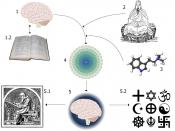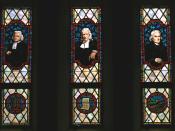Kolbie Pankratz Phil 3600 001 Brian Birch October 13, 2001 The Relativity of Religious Experience Many philosophers and theists over time have debated about the nature of religious experience. Various people have made arguments claiming that religious experiences are the same. Within this group there are people who claim that the descriptions of religious experiences contain a similarity that transcends religious diversity. Others in this group claim that the experience is the same but the interpretations of it are culturally bound. As a result, various interpretations arise from a single religious experience. More evidence, however, points to the argument that claims that there is no single religious experience. Not only is there not a common experience to all religions, but also there is not common interpretation of the experiences either. Religious experience is interwoven with cultural constructs, and meaning can only be derived from the experience within a particular culture or religion.
Philosophers such as Walter Stace have argued that there is a common core to religious experience. This core is more fundamentally important than the various interpretations of the experience based on cultural, religious beliefs. His aspects of the common core are very abstract. For example, in "The Nature and Types of Religious and Mystical Experience" Stace claims that a unity with the self and the Ultimate Reality is fundamental. He claims that the core experience is non-spacial and non-temporal. It is paradoxical and ineffable. The experience includes a feeling of blessedness or peace, and the presence of the holy, sacred, or divine. While these core aspects of religious experience do seem common, they are not fundamentally important in the way that Stace claims that they are. To the individual who has a religious experience, it is not the paradoxicality or ineffability of the experience that matters. For a Christian, it is the communion with a personal, moral God that is essential. For a Buddhist, it is the recognition and abolition of suffering achieved through Nirvana. What is fundamentally important in the experience is the aspect of God or Nirvana that affirms the person's existing beliefs. This type of response given to Stace's argument about the common core is of religious experience can be found in Steven Katz's article called "Language, Epistemology, and Mysticism".
Another aspect that would lead to the conclusion that the core aspects of religious experience that Stace gives are not fundamentally important is in regard to paradoxicality and ineffability. These two things do not contribute to the essential meaning of the experience. If an experience is ineffable, then it is impossible to accurately describe it with words. This would mean that the words used to describe religious experience do not carry literal meaning. If this is true, then one can't take religious experience and break it down into common aspects like Stace has done. In fact, this makes it impossible to derive any absolute truth from religious experience at all, and the experience is valuable only as far as it provides meaning to the individual who experienced it.
In regard to paradoxicality, it may be true that most religious experiences have some aspect that could be considered paradoxical, however, it does not follow that because two separate experiences are paradoxical that they are the same experience. As Katz would say, this type of category says nothing about the content of these experiences. As a result, paradoxicality may be common to much of religious experience but it is not a fundamentally important aspect of the experience.
Walter Stace believes that there are core aspects to religious experience because of similarities in descriptions of the experiences. These similarities, however, do not necessarily mean that the experiences are the same. This leads to some flaws in the language. Katz would argue that because objects sound similar does not mean they are the same object. The core aspects that Stace gives are very general and abstract, and could be applied to any number of things. Just because these aspects are present in religious experience does not guarantee that there is an absolute truth or single experience behind the interpretations that people give. Stace's argument is weak for asserting this connection.
Another flaw in Stace's argument is where he claims that there is a single experience that transcends all religions. Although it may be possible for Stace to assert that there are commonalities between religious experiences, there is no possible way to make the assumption that the experiences are all the same based upon the evidence given. Katz argues that there is not an intelligent way to argue that the "ÃÂno-thing-ness' of Brahman is even similar to a Christian experience of an intense love between an individual and God. Although both may lead one to the conclusion of a union between the self and the Ultimate Reality, nothing exists in the descriptions of these experiences that could lead to the assumption that they are ultimately the same experience.
Another argument that can be given against Stace's theory is that it is impossible to separate the experience from the interpretation of it. Stace takes a dualistic approach and claims that it is possible, but Katz argues against that. Not only are cultural and religious concepts at work in the interpretation of an experience, but they are working in the mind before and during the experience as well. Katz would argue that a person's beliefs assist in shaping the experience at least as much as the experience helps to shape a person's beliefs. If this were not true, more Christians might report having a Buddhist experience and vice versa. Christians go into a religious experience expecting to experience God. When they are having the experience, they feel God, not Nirvana. And after the experience is over, in reflection, they know that it was God. In this way, their beliefs about Christianity caused them to have the experience of God and ultimately their experience of God helped to support their beliefs about Christianity.
In addition, to the idea that you can't separate the experience from the interpretation of it, there is no universal and neutral stand point from which you can examine a religious experience to determine the truthfulness of it. Although Stace argues for a common core, it is obvious that a Christian is not going to agree with a Hindu that they had the same experience. Who then can stand apart from these two without bias and say which is correct? In religious experience, there is no third party which can stand by and judge the truthfulness of an experience without bringing in his or her own cultural and religious bias. Some would argue that reason could be used to determine truth. Many rational arguments have been thrown around to find this core, absolute truth that Stace seems to argue for. However, even reason itself is learned within the parameters of culture and religion. There is no possible way to argue for an absolute truth or reason. This is evident because over time, no one has been able to prove any one single thing to all rational beings. People frequently try to use reason to prove what they already believe, and if that doesn't work, then it gets waived off as a mystery. Because of this, no third party can claim that they are more reasonable and can determine the truth or core of any religious experience. Even Walter Stace is biased by his own background and culture.
Stace's argument regarding the common aspects of religious experience would work better if he did not assert afterwards that it follows that the experiences are the same. The common, core aspects of religious experience that he mentions do seem to be common, however, no evidence supports the assumption that there is a single religious experience. The evidence given here, in fact, leads to the conclusion that there is no single religious experience, nor is there any single interpretation. This could be taken even further to say that there is no way for any person on earth to determine an absolute truth that could be derived from religious experience. The experiences are only useful as far as they support the beliefs of the people who have them.





